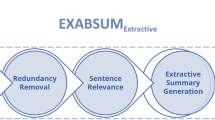Abstract
Today, research on automatic text summarization challenges on readability factor as one of the most important aspects of summarizers’ performance. In this paper, we present Pazesh: a language-independent graph-based approach for increasing the readability of summaries while preserving the most important content. Pazesh accomplishes this task by constructing a special path of salient sentences which passes through topic centroid sentences. The results show that Pazesh compares approvingly with previously published results on benchmark datasets.
Access this chapter
Tax calculation will be finalised at checkout
Purchases are for personal use only
Preview
Unable to display preview. Download preview PDF.
Similar content being viewed by others
References
Luhn, H.P.: The automatic creation of literature abstracts. IBM Journal of Research Development 2(2), 159–165 (1958)
Salton, G., Singhal, A., Mitra, M., Buckley, C.: Automatic Text Structuring and Summarization. Information Processing and Management Journal 33(2), 193–207 (1997)
Mihalcea, R.: Graph-based ranking algorithms for sentence extraction, applied to text summarization. In: Proceedings of ACL, Spain (2004)
Erkan, G., Radev, D.R.: LexRank: Graph-based Lexical Centrality as Salience in Text Summarization. JAIR 22, 457–479 (2004)
Aker, A., Cohn, T., GaizauskasMulti, R.: Document summarization using A* search and discriminative training. In: Proceedings of EMNLP, USA, pp. 482–491 (2010)
Riedhammer, K., Gillick, D., Favre, B., Hakkani-T, D.: Packing the meeting summarization knapsack. In: Proceedings of the Interspeech Conference, Australia, pp. 2434–2437 (2008)
Barzilay, R., Elhadad, N., McKeown, K.R.: Inferring strategies for sentence ordering in multidocument news summarization. JAIR 17, 35–55 (2002)
Hearst, M.A.: Texttiling: segmenting text into multi-paragraph subtopic passages. CL 23(1), 33–64 (1997)
Page, L., Brin, S., Motwani, R., Winograd, T.: The pagerank citation ranking: Bringing order to the web. Technical report, Stanford University, USA (1998)
Xiaojun, W., Jianwu, Y., Jianguo, X.: Towards an iterative reinforcement approach for simultaneous document summarization and keyword extraction. In: Proceedings of the 45th ACL, Czech Republic, pp. 552–559 (2007)
Author information
Authors and Affiliations
Editor information
Editors and Affiliations
Rights and permissions
Copyright information
© 2011 Springer-Verlag Berlin Heidelberg
About this paper
Cite this paper
Mostafazadeh, N., Mirroshandel, S.A., Ghassem-Sani, G., Bakhshandeh Babarsad, O. (2011). Pazesh: A Graph-Based Approach to Increase Readability of Automatic Text Summaries. In: Butz, C., Lingras, P. (eds) Advances in Artificial Intelligence. Canadian AI 2011. Lecture Notes in Computer Science(), vol 6657. Springer, Berlin, Heidelberg. https://doi.org/10.1007/978-3-642-21043-3_38
Download citation
DOI: https://doi.org/10.1007/978-3-642-21043-3_38
Publisher Name: Springer, Berlin, Heidelberg
Print ISBN: 978-3-642-21042-6
Online ISBN: 978-3-642-21043-3
eBook Packages: Computer ScienceComputer Science (R0)




